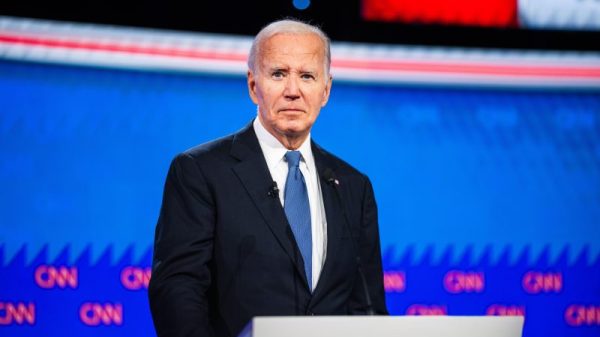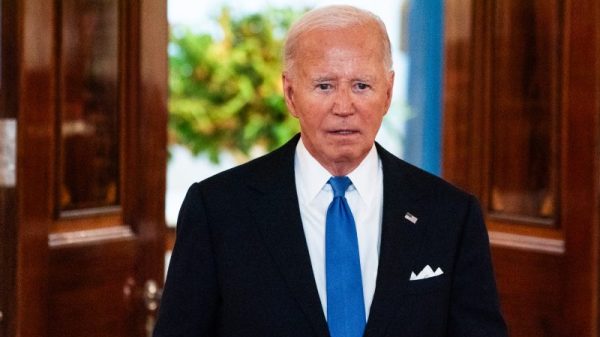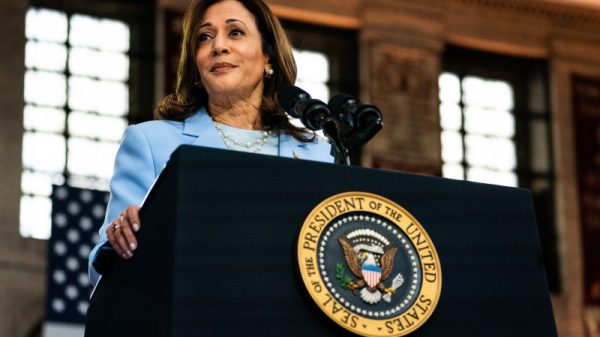Gov. Ron DeSantis’s campaign to make Florida “where woke goes to die” hits the occasional speed bump. For example, his moves against the state’s largest employer, Disney, over its opposition to the Parental Rights in Education Act have earned him rebukes from several high-profile Republicans, who argue that they amount to a thinly veiled effort — an un-conservative one — to use the government to police corporate speech. Former president Donald Trump criticized DeSantis’s effort, which has included nullifying development agreements, as ill-conceived. And it’s earned DeSantis a dicey lawsuit from Disney alleging he infringed upon its First Amendment rights.
But the Florida governor and 2024 GOP presidential candidate appears in no way chastened. Because now he’s talking about an apparently even more punitive and remarkable effort to use the levers of government to go after another megabrand he has targeted for its supposed “wokeness,” Bud Light.
DeSantis has announced he is asking State Board of Administration officials to review the state’s stock holdings in Bud Light’s parent company, AB InBev. The idea is that the stock accounts for a large share of the holdings — DeSantis has pegged it at $50 million — and so Bud Light losing money after it partnered with transgender influencer Dylan Mulvaney hurt those who hold state pensions.
DeSantis claims Bud Light “may have breached legal duties owed to its shareholders” by associating its brand with “radical social ideologies.”
Left unstated: DeSantis promoted a boycott over the Mulvaney partnership that wound up costing Bud Light. He’s now effectively citing the results of that boycott to say the government should get involved.
The first thing to note is that this appears to be political posturing; experts see little in the way of legal recourse for the state. DeSantis has certainly demonstrated that he will actually wield his power to wage these kinds of hot-button culture war issues — as opposed to just talk about them — but his options appear limited.
Joshua A. Lichtenstein, an expert on fiduciary law at the law firm Ropes & Gray, said Bud Light was insulated by the fact that this was at least intended to be a marketing decision, geared to selling the product, not just making a political statement.
“From a legal standpoint, I don’t think this a serious theory or a serious attempt with a legal basis,” Lichtenstein said.
Another expert, Michael E. Swartz of Schulte Roth & Zabel, noted that companies generally have broad discretion as long as strategic decisions are made in good faith.
“Here, agree or disagree with the ad campaign, it would be difficult to say there is no reasonable business justification for AB InBev’s decision,” Swartz said. “So it does not appear that SBA has legal recourse for breach of a duty to them by AB InBev’s board based on any harm to the company that may have resulted from the ad campaign.”
Relatedly, there’s the matter of just what DeSantis is at least talking about doing. It’s a remarkable statement of intent in the GOP’s long-running lurch toward using government to combat supposedly “woke” corporations.
The biggest example with DeSantis, of course, is Disney. But in that case, the effort was at least initially couched as not being about Disney’s political statements. Disney had been critical of Florida Republicans’ efforts to restrict discussion of LGBTQ+ discussion in schools — dubbed the “don’t say gay” bill by its critics — and DeSantis fought back. But he initially said his move to strip Disney of its special tax status was in fact about his general opposition to such arrangements.
“I would not say that would be retaliatory,” DeSantis said at the time. “I don’t think we should have special privileges in the law at all.”
While the “don’t say gay” bill dealt with instruction in schools, Bud Light’s partnering with Mulvaney was a relatively small marketing move. The company sent her a can with her face on it in exchange for her promoting a $15,000 giveaway.
It’s true that partnering with a transgender influencer clearly rubbed many social conservatives the wrong way. But DeSantis’s contention is that this arrangement was so outside the bounds — he calls it aligning with “radical social ideologies” — that it could amount to breaching Bud Light’s fiduciary responsibilities. Polls show that more than 4 in 10 Americans say a person’s gender can differ from what it was at birth. And Americans are about evenly split when it comes to whether we’ve gone too far or not far enough in accepting transgender people.
Crucially, however, it wasn’t just Bud Light’s decision that hurt its business model; it was also the likes of DeSantis himself encouraging people to boycott — a boycott that appears to have exacted a significant toll. DeSantis in April said Bud Light would keep doing what it was doing unless people stopped drinking its product.
“I think [the] pushback is in order across the board, including with Bud Light,” DeSantis said.
DeSantis didn’t directly say that people should boycott, but he clearly played up the idea when asked about it, even singling out Bud Light as a particularly potent opportunity for a boycott to send a message.
“Not on every company, because sometimes conservative consumers aren’t going to make a dent in some companies,” DeSantis said. “This one is one if you don’t have conservative beer drinkers, you’re going to feel that.”
By June, DeSantis quipped while serving drinks at an event in Nevada: “I’ll serve you anything except Bud Light. I just can’t do that.”
Trump shied away from the boycott, and Donald Trump Jr. even called for an end to it shortly before DeSantis’s comments. But the governor played a role in keeping it going and hurting AB InBev’s bottom line.
Now DeSantis is suggesting that the business losses that resulted at least in part from a boycott he promoted from his perch as a governor mean the government should investigate the company.
Yet again, his fellow Republicans will need to decide how far is too far in using the government to go after supposedly “woke” businesses.





























